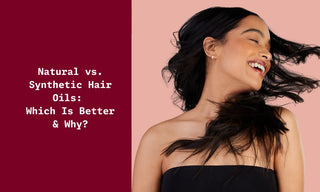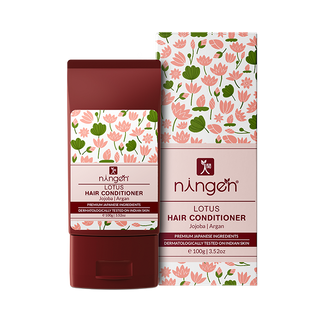जब बालों के लिए सही तेल चुनने की बात आती है, तो नेचुरल और सिंथेटिक विकल्पों के बीच बहस अक्सर हमें यह सोचने पर मजबूर कर देती है कि कौन सा वास्तव में हमारे बालों के लिए फायदेमंद है। चाहे आप सूखे बालों को पोषण देने के लिए, फ्रिज़ को कंट्रोल करने के लिए, या बस स्वस्थ लटों को बनाए रखने के लिए तेल तलाश रहे हों, इन दोनों प्रकार के तेलों के बीच अंतर को समझना आपके हेयरकेयर रूटीन में बड़ा बदलाव ला सकता है। इस ब्लॉग में, हम नेचुरल और सिंथेटिक हेयर ऑयल्स के फायदे और नुकसानों पर चर्चा करेंगे, ताकि आप यह तय कर सकें कि आपके बालों की जरूरतों के लिए कौन सा तेल सबसे उपयुक्त है। तो, आइए समझते हैं: प्राकृतिक बनाम सिंथेटिक हेयर ऑयल्स: कौन सा बेहतर है और क्यों?
In This Article;
नेचुरल हेयर ऑयल्स क्या होते हैं?
नेचुरल हेयर ऑयल्स को उनकी क्षमता के लिए जाना जाता है कि ये हेयर शाफ्ट में पैठ बना सकते हैं, जो कि हेयर स्ट्रेंथ, मोइश्चर रिटेंशन और शाइन को सुधारने में मदद करते हैं। ये ऑयल्स कई विटामिन्स, एंटीऑक्सीडेंट्स और फैटी एसिड्स भी कंटेन करते हैं जो हेल्दी हेयर फॉलिकल्स को मेंटेन करने और ओवरऑल हेयर हेल्थ को प्रमोट करने के लिए जरूरी होते हैं।
इसके अलावा, नेचुरल हेयर ऑयल्स में सिंथेटिक फ्रेग्रेन्स, पैराबेन्स या सल्फेट्स नहीं होते जो कुछ सिंथेटिक हेयर केयर प्रोडक्ट्स में पाए जाते हैं।
नेचुरल हेयर ऑयल्स प्लांट्स, सीड्स, नट्स या फूलों से डेराइव किए जाते हैं, और ये ह्यूमन हेयर और स्कैल्प को नॉरिश और ट्रीट करने के लिए यूज किए जाते हैं। ये ऑयल्स सामान्यत: कोल्ड प्रेसिंग या स्टीम डिस्टिलेशन जैसे मेथड्स से एक्सट्रैक्ट किए जाते हैं, जिससे सोर्स इंग्रेडिएंट्स के नैचुरल न्यूट्रिएंट्स और बेनिफिशियल प्रॉपर्टीज प्रिजर्व हो जाती हैं।
नेचुरल हेयर ऑयल्स ऑर्गेनिक सब्सटेंस से बने होते हैं जो हमारे स्कैल्प के नैचुरल ऑयल्स के बिल्कुल करीब होते हैं। इसलिये ये हमारे हेयर और स्कैल्प के लिए काफी कम्पैटिबल होते हैं, जिसका मतलब है कि साइड इफेक्ट्स और एलर्जी रिएक्शन्स का चांस कम होता है।
हेयर ऑइल्स का कम्पोजीशन और एक्सट्रैक्शन मेथड्स हर टाइप और सोर्स के हिसाब से अलग होते हैं। जैसे कि नारियल तेल में लॉरिक एसिड होता है, जो कंडीशनिंग प्रॉपर्टीज के लिए जाना जाता है, वैसे ही दूसरे ऑइल्स में विटामिन E और A होते हैं, जो प्रोटेक्शन और न्यूट्रीशन देते हैं।
एक्सट्रैक्शन मेथड्स भी हेयर ऑइल की क्वालिटी को तय करते हैं। कोल्ड प्रेसिंग में तेल को बिना हीट के प्रेस करके निकाला जाता है, जिससे नैचुरल कंपाउंड्स टूटते नहीं हैं। स्टीम डिस्टिलेशन में वॉटर वेपर का इस्तेमाल करके एसेंशियल ऑइल्स को एक्सट्रैक्ट किया जाता है, जो उनके वोलाटाइल कंपाउंड्स और सेंट को प्रिजर्व करता है। ये मेथड्स यह सुनिश्चित करते हैं कि नैचुरल इंग्रेडिएंट्स अपनी पोटेंट प्रॉपर्टीज को बनाए रखें और सिंथेटिक केमिकल्स से फ्री रहें।
कॉमन नैचुरल ऑइल्स:
कुछ कॉमन नैचुरल हेयर ऑइल्स हैं, जो अलग-अलग हेयर नीड्स के लिए फायदेमंद होते हैं:
- नारियल तेल: यह तेल मोइश्चर-सीलिंग प्रॉपर्टीज के लिए जाना जाता है। यह ड्राई हेयर के लिए बेस्ट है और हेयर ब्रेकेज और स्प्लिट एंड्स को प्रिवेंट करता है।
- आर्गन तेल: इसे लिक्विड गोल्ड कहा जाता है, क्योंकि इसमें फैटी एसिड्स और विटामिन E होता है। यह फ्रिज़ी हेयर को सॉफ्टनेस और शाइन देता है।
- जोजोबा तेल: यह ह्यूमन सेबम के बहुत करीब होता है, इसलिए सभी हेयर टाइप्स के लिए सूटेबल है, खासकर उनके लिए जिनके स्कैल्प सेंसिटिव होते हैं।
- ऑलिव तेल: यह एंटीऑक्सीडेंट्स से भरपूर होता है और स्कैल्प हेल्थ को मेंटेन करने में मदद करता है, डेमेज से प्रोटेक्शन देता है।
- कैस्टर तेल: यह राइसिनोलेक एसिड से रिच होता है, जो फॉलिकल्स तक ब्लड सर्कुलेशन को बूस्ट करने में मदद करता है और हेयर ग्रोथ को प्रमोट करता है।
- टी ट्री तेल: इसके एंटीफंगल और एंटीबैक्टीरियल प्रॉपर्टीज हैं, जो हेयर फॉलिकल्स को अनक्लॉग करने और डैंड्रफ को ट्रीट करने में मददगार होते हैं।
- बादाम तेल: यह बायोटिन से रिच होता है, जो हेयर को स्ट्रेंथ करता है, ग्रोथ को प्रमोट करता है और थिनिंग को कम करता है।
यह सब तेल अपने यूनिक बेनिफिट्स के साथ अलग-अलग हेयर प्रॉब्लम्स को अड्रेस करते हैं।
सिंथेटिक हेयर ऑइल्स क्या हैं?
सिंथेटिक हेयर ऑइल्स वो हेयर केयर प्रोडक्ट्स होते हैं जो केमिकल कंपाउंड्स से बने होते हैं, जो नैचुरल इंग्रेडिएंट्स से नहीं होते। ये ऑइल्स लैब्स में बनाए जाते हैं और इन्हें नैचुरल हेयर ऑइल्स के एक्शन्स को नकल करने या बेहतर बनाने के लिए डिज़ाइन किया जाता है। सिंथेटिक ऑइल्स का इस्तेमाल ब्यूटी इंडस्ट्री में उनकी कंसिस्टेंसी, लंबी शेल्फ लाइफ और नैचुरल ऑइल्स के मुकाबले सस्ते होने की वजह से किया जाता है।
सिंथेटिक हेयर ऑइल्स को लैब में केमिकल कंपाउंड्स से फॉर्मुलेट किया जाता है, जो बालों को कंडीशन, प्रोटेक्ट और स्टाइल करने का काम करते हैं। इनमें अक्सर सिलिकॉन जैसे डाइमेथिकोन और सिंथेटिक फ्रेग्रेन्सेस होते हैं, जो नॉन-ग्रीसी और आसानी से अवशोषित होने वाले प्रोडक्ट्स पर फोकस करते हैं। ये नैचुरल ऑइल्स की तरह बालों के अंदर गहरे तक नहीं पहुँचते, लेकिन ये बालों की सतह पर एक प्रोटेक्टिव लेयर बनाने में अच्छे होते हैं।
कॉमन सिंथेटिक ऑइल्स
सिंथेटिक हेयर ऑइल्स की काफी वैराइटी उपलब्ध है, लेकिन कुछ ऐसे ऑइल्स हैं जो अपनी प्रभावशीलता के लिए पॉपुलर हो गए हैं और कई स्टाइलिंग प्रोडक्ट्स में पाए जाते हैं। यहाँ कुछ कॉमन सिंथेटिक ऑइल्स की लिस्ट दी गई है:
- सिलिकोन-बेस्ड ऑइल्स: इनमें Cyclomethicone और Dimethicone जैसे इंग्रेडिएंट्स होते हैं, जो बालों में शाइन और स्मूदनेस डालते हैं और एक स्लीक फिनिश देते हैं।
- मिनरल ऑइल: पेट्रोलियम डिस्टिलेशन का एक बायप्रोडक्ट, मिनरल ऑइल सस्ता होता है और इसका इस्तेमाल अक्सर मोइश्चर को लॉक करने के लिए किया जाता है।
- पैराफ़िनम लिक्विडम: यह भी पेट्रोलियम डेरिवेटिव है, यह तेल बहुत रिफाइंड और क्लियर होता है, और इसे बालों को डिटैंगल करने और ग्लॉस देने के लिए इस्तेमाल किया जाता है।
नैचुरल हेयर ऑइल्स के फायदे:
- न्यूट्रिशन: विटामिन्स और एंटीऑक्सीडेंट्स से भरपूर, जो बालों को स्ट्रेंथ करते हैं और स्कैल्प की ओवरऑल हेल्थ को प्रमोट करते हैं।
- डीप मोइश्चराइजेशन: यह बालों के शाफ्ट में प्रवेश करता है, लंबे समय तक मोइश्चर प्रदान करता है और ड्रायनेस को कम करता है।
- नैचुरल शाइन: नैचुरल लस्टर को बिना सिंथेटिक इंग्रेडिएंट्स के बढ़ाता है।
- कम डैमेज: यह बालों को पर्यावरणीय नुकसान और ब्रेकेज से बचाने में मदद करता है।
- कम रासायनिक तत्व: सिंथेटिक फ्रेग्रेन्सेस, पैराबेन्स और सल्फेट्स से मुक्त होता है, जो इसे बालों और स्कैल्प पर ज्यादा सौम्य बनाता है।
- बेहतर हेयर हेल्थ: नियमित उपयोग से बाल मजबूत, मुलायम और हेल्दी हो सकते हैं।
नैचुरल हेयर ऑइल्स के ड्रॉबैक्स:
- हेवीनेस: कुछ नैचुरल ऑइल्स मोटे और भारी होते हैं, जो फाइन या थिन हेयर को नीचे की ओर खींच सकते हैं।
- ग्रीसी रेज़िड्यू:अगर ज्यादा लगाया जाए, तो नैचुरल ऑइल्स ग्रीसी रेज़िड्यू छोड़ सकते हैं, जिससे बाल ऑइली नजर आ सकते हैं।
- एलर्जी रिएक्शन्स: कुछ नैचुरल ऑइल्स एलर्जी रिएक्शन्स या सेंसिटिव लोगों में जलन पैदा कर सकते हैं।
- लंबा अवशोषण समय: नैचुरल ऑइल्स को बालों में समाने में अधिक समय लग सकता है, और परिणाम देखने में भी समय लगता है।
- सीमित हीट प्रोटेक्शन: ये सिंथेटिक ऑइल्स जितना हीट प्रोटेक्शन नहीं देते, जिससे स्टाइलिंग के लिए अतिरिक्त प्रोडक्ट्स की जरूरत हो सकती है।
सिंथेटिक हेयर ऑइल्स के फायदे:
- लाइटवेट फॉर्मूला: सिंथेटिक ऑइल्स अक्सर नॉन-ग्रीसी और लाइटवेट डिज़ाइन किए जाते हैं, जो सभी हेयर टाइप्स के लिए उपयुक्त होते हैं।
- इंस्टेंट रिजल्ट्स: ये तुरंत शाइन, स्मूदनेस और फ्रिज़ कंट्रोल प्रदान करते हैं, जिससे बाल तुरंत पॉलिश्ड नजर आते हैं।
- हीट प्रोटेक्शन: कई सिंथेटिक ऑइल्स हीट प्रोटेक्शन प्रदान करते हैं, जो स्टाइलिंग टूल्स से होने वाले नुकसान से बालों की सुरक्षा करते हैं।
- लंबी शेल्फ लाइफ: सिंथेटिक ऑइल्स की शेल्फ लाइफ नैचुरल ऑइल्स के मुकाबले ज्यादा होती है, जिससे ये ज्यादा टिकाऊ और किफायती होते हैं।
- टार्गेटेड परफॉर्मेंस: ये विशेष उद्देश्यों के लिए फॉर्मुलेट किए जाते हैं जैसे कि डिटैंगलिंग, ग्लॉस बढ़ाना, या UV प्रोटेक्शन देना।
सिंथेटिक हेयर ऑइल्स के ड्रॉबैक्स:
- सतही लाभ: ये अक्सर बालों की सतह पर रहते हैं, और गहरे से पोषण या मरम्मत करने के बजाय सिर्फ अस्थायी प्रभाव देते हैं।
- पोटेंशियल बिल्ड-अप: बार-बार इस्तेमाल करने से रेज़िड्यू का बिल्ड-अप हो सकता है, जिससे बाल समय के साथ भारी या ग्रीसी महसूस हो सकते हैं।
- केमिकल इंग्रेडिएंट्स: कुछ सिंथेटिक ऑइल्स में सिलिकोन, पैराबेन्स या अन्य केमिकल्स होते हैं, जो जलन या लंबे समय में नुकसान कर सकते हैं।
- न्यूट्रिएंट्स की कमी: नैचुरल ऑइल्स की तरह सिंथेटिक वर्जन में आवश्यक विटामिन्स, एंटीऑक्सिडेंट्स और फैटी एसिड्स की कमी हो सकती है, जो बालों की सेहत के लिए फायदेमंद होते हैं।
- पर्यावरणीय प्रभाव: सिंथेटिक ऑइल्स का उत्पादन और निपटान पर्यावरण को नुकसान पहुंचा सकता है, जिससे प्रदूषण बढ़ता है।
अपने हेयर टाइप के लिए सही हेयर ऑइल कैसे चुनें?
- अपने हेयर टाइप की पहचान करें: यह जानें कि आपके बाल मोटे, फाइन, कर्ली, ऑइली, स्ट्रेट या ड्राई हैं। हर हेयर टाइप के लिए अलग-अलग तेल फायदेमंद हो सकते हैं।
- अपने हेयर नीड्स पर विचार करें: क्या आप हाइड्रेशन, फ्रिज़ कंट्रोल, स्कैल्प हेल्थ, या हीट प्रोटेक्शन ढूंढ रहे हैं? अपनी जरूरतों को समझने से आपको बेहतर चुनाव करने में मदद मिलेगी।
- तेल के गुणों पर रिसर्च करें: विभिन्न तेलों के फायदे जानें। जैसे, नारियल तेल मोइश्चर के लिए, आर्गन तेल शाइन के लिए, और जोजोबा तेल स्कैल्प हेल्थ के लिए अच्छा है।
- एलर्जी चेक करें: यह सुनिश्चित करें कि आप किसी तेल के इंग्रेडिएंट्स से एलर्जी तो नहीं हैं, खासकर अगर आपकी स्किन या स्कैल्प सेंसिटिव हो।
- लेबल पढ़ें: अगर आप नैचुरल इंग्रेडिएंट्स पसंद करते हैं, तो कम या बिना सिंथेटिक एडिटिव्स वाले तेल को चुनें।
- एक छोटा सा टेस्ट करें: पूरी तरह से अप्लाई करने से पहले, तेल को एक छोटे बाल के हिस्से पर टेस्ट करें और देखें कि आपके बालों पर इसका असर कैसे होता है।
- एक प्रोफेशनल से सलाह लें: अगर संदेह हो, तो हेयर केयर प्रोफेशनल या डर्मैटोलॉजिस्ट से अपनी हेयर टाइप और कंडीशन के आधार पर सिफारिशें लें।
नैचुरल हेयर ऑइल्स सिंथेटिक हेयर ऑइल्स से बेहतर क्यों हैं?
नैचुरल हेयर ऑइल्स को सिंथेटिक हेयर ऑइल्स से बेहतर माना जाता है, इसके कई कारण हैं:
- न्यूट्रिएंट-रिच कम्पोजीशन: नैचुरल हेयर ऑइल्स में विटामिन्स, एंटीऑक्सीडेंट्स और फैटी एसिड्स की भरमार होती है, जो बालों को जड़ से लेकर सिरे तक पोषण देते हैं।
- डीप पेनेट्रेशन: नैचुरल ऑइल्स सिंथेटिक ऑइल्स के मुकाबले बालों के शाफ्ट में गहरे तक प्रवेश कर सकते हैं, जिससे लंबे समय तक नमी मिलती है और अंदर से नुकसान को ठीक करने में मदद मिलती है। यह गहरी कंडीशनिंग बालों को समय के साथ मुलायम और ज्यादा लचीला बना देती है।
- कम रासायनिक तत्व: सिंथेटिक ऑइल्स के मुकाबले नैचुरल हेयर ऑइल्स में कठोर रसायन, सिलिकॉन और कृत्रिम खुशबू नहीं होती, जिससे ये बालों और स्कैल्प पर सौम्य होते हैं, और जलन, बिल्ड-अप, और लंबे समय तक नुकसान का खतरा कम होता है।
- पर्यावरण के लिए अनुकूल: नैचुरल हेयर ऑइल्स सस्टेनेबल, प्लांट-बेस्ड सोर्स से लिए जाते हैं और बायोडिग्रेडेबल होते हैं, जिससे ये सिंथेटिक ऑइल्स के मुकाबले पर्यावरण के लिए ज्यादा इको-फ्रेंडली होते हैं, जो अक्सर प्रदूषण का कारण बनते हैं।
- बालों और स्कैल्प के साथ संगति: नैचुरल ऑइल्स हमारे स्कैल्प द्वारा स्वाभाविक रूप से उत्पादित ऑइल्स के समान होते हैं, जिससे ये विशेष रूप से हमारे बालों के लिए अनुकूल होते हैं। यह संगति कम साइड इफेक्ट्स और एलर्जी की प्रतिक्रिया की संभावना को घटाती है।
- होलिस्टिक लाभ: कई नैचुरल हेयर ऑइल्स अतिरिक्त थैरेप्यूटिक लाभ प्रदान करते हैं, जैसे रिलैक्सेशन और तनाव को कम करना, जो उनकी नैचुरल खुशबू और एसेंशियल ऑइल कंटेंट की वजह से होता है। इससे केवल हेयर केयर नहीं, बल्कि एक समग्र अनुभव मिलता है।
हेयर ऑइल्स में खुशबू का प्रभाव
हेयर ऑइल्स में खुशबू केवल एक मनमोहक खुशबू देने के लिए नहीं होती, बल्कि यह बालों की सेहत और दिखावट पर भी असर डाल सकती है। ये कच्चे सामग्री की गंध को छुपाती हैं, सेंसेरी अपील बढ़ाती हैं, और यूज़र संतुष्टि में योगदान करती हैं। हालांकि, खुशबू बालों के कूप और स्कैल्प से इंटरैक्ट कर सकती है, और सेंसिटिव व्यक्तियों में जलन पैदा कर सकती है। नैचुरल और सिंथेटिक खुशबू के बीच चुनाव हेयर ऑइल की परफॉर्मेंस को प्रभावित कर सकता है, क्योंकि दोनों के अलग-अलग गुण होते हैं, जो बालों के शाफ्ट और क्यूटिकल पर अलग-अलग तरीके से असर डालते हैं।
नैचुरल खुशबू के फायदे
नैचुरल खुशबू अक्सर नैचुरल ऑइल्स के साथ होती है, जो थैरेप्यूटिक गुण प्रदान करती है, जैसे:
- स्कैल्प को पोषण देना, एसेंशियल ऑइल्स के साथ जो रिलैक्सेशन और तनाव को कम करने में मदद करते हैं।
- एंटीऑक्सीडेंट्स से भरपूर, जो बालों को पर्यावरणीय नुकसान से बचाने में मदद कर सकते हैं।
- अतिरिक्त नमी प्रदान करना, खासकर उन लोगों के लिए जो कर्ली या फ्रिज़ी बालों के साथ होते हैं और जिन्हें नमी की कमी होती है।
सिंथेटिक खुशबू के संभावित मुद्दे
सिंथेटिक खुशबू आमतौर पर सिंथेटिक रसायनों के मिश्रण से तैयार की जाती है, जो प्राकृतिक खुशबू की नकल करने के लिए बनाई जाती है। हालांकि, ये आमतौर पर स्ट्रॉन्ग और लॉन्ग-लास्टिंग होते हैं, लेकिन इसके नकरात्मक प्रभाव हो सकते हैं:
- स्कैल्प पर जलन, खासकर उन यूज़र्स के लिए जो सेंसिटिव या एलर्जिक होते हैं, क्योंकि इनमें कठोर रसायन हो सकते हैं।
- स्कैल्प के ऑइल्स के प्राकृतिक संतुलन को बिगाड़ना, जिससे बाल बहुत ड्राई या बहुत ऑइली हो सकते हैं।
- बिल्ड-अप होना, जो बालों के कूप को ब्लॉक कर सकता है और आवश्यक न्यूट्रिएंट्स को बालों के शाफ्ट तक पहुँचने से रोक सकता है।
निष्कर्ष
आशा है कि हमारा लेख “नैचुरल बनाम सिंथेटिक हेयर ऑइल्स” ने आपको अच्छे से मार्गदर्शन किया। जब आप नैचुरल और सिंथेटिक हेयर ऑइल्स के बीच चुनाव कर रहे हैं, तो अपने बालों के प्रकार, जरूरतों और लंबे समय तक सेहत को ध्यान में रखें। नैचुरल ऑइल्स, जो सिंथेटिक रसायनों से मुक्त होते हैं, बालों को फैटी एसिड्स और न्यूट्रिएंट्स के साथ पोषण देते हैं, जिससे बालों की मजबूती और सेहत को बढ़ावा मिलता है, जबकि सिंथेटिक ऑइल्स तुरंत शाइन और डिटैंगलिंग प्रदान करते हैं, और हीट-रेसिस्टेंट होते हैं, लेकिन इनमें कुछ यौगिक हो सकते हैं जो समय के साथ जलन पैदा कर सकते हैं।
क्विक व्यू
यह ब्लॉग नैचुरल और सिंथेटिक हेयर ऑइल्स की तुलना करता है, उनके फायदे, ड्रॉबैक्स और बालों पर उनके प्रभाव को एक्सप्लोर करता है। नैचुरल ऑइल्स विटामिन्स और एंटीऑक्सीडेंट्स से बालों को पोषण देते हैं, जबकि सिंथेटिक ऑइल्स तुरंत शाइन और हीट प्रोटेक्शन प्रदान करते हैं। सही तेल का चयन आपके बालों के प्रकार, जरूरतों और लंबे समय तक सेहत पर निर्भर करता है।
अक्सर पूछे जाने वाले प्रश्न
Q1: नैचुरल और सिंथेटिक हेयर ऑइल्स के बीच मुख्य अंतर क्या है?
A1: नैचुरल हेयर ऑइल्स प्लांट-बेस्ड सोर्स से लिए जाते हैं, जो पोषण और नमी प्रदान करते हैं, जबकि सिंथेटिक ऑइल्स रसायनों से लैब में बनाए जाते हैं जो शाइन और हीट प्रोटेक्शन जैसे विशिष्ट लाभ देने के लिए डिज़ाइन किए जाते हैं।
Q2: सूखे बालों के लिए कौन सा हेयर ऑइल बेहतर है?
A2: नैचुरल ऑइल्स जैसे नारियल या आर्गन ऑइल सूखे बालों के लिए बेहतर होते हैं, क्योंकि ये गहरे तक समाते हैं, लंबे समय तक नमी प्रदान करते हैं और फ्रिज़ को कम करते हैं।
Q3: क्या सिंथेटिक हेयर ऑइल्स के बालों पर कोई लंबे समय तक प्रभाव पड़ते हैं?
A3: सिंथेटिक ऑइल्स बालों और स्कैल्प पर बिल्ड-अप कर सकते हैं, जो समय के साथ जलन या बालों की समस्याएँ पैदा कर सकते हैं क्योंकि इनमें रासायनिक तत्व होते हैं।
Q4: क्या नैचुरल हेयर ऑइल्स से एलर्जी हो सकती है?
A4:हाँ, कुछ लोग खासकर जिनकी स्किन या स्कैल्प सेंसिटिव हो, कुछ नैचुरल ऑइल्स से एलर्जी रिएक्शन्स या जलन महसूस कर सकते हैं।
Q5: क्या सिंथेटिक हेयर ऑइल्स रोज़ाना इस्तेमाल के लिए सुरक्षित होते हैं?
A5:जबकि सिंथेटिक ऑइल्स रोज़ाना इस्तेमाल किए जा सकते हैं, लेकिन इनमें सिलिकॉन जैसे रसायन हो सकते हैं, जो बिल्ड-अप कर सकते हैं, इसलिए इनका इस्तेमाल संयम से करें।
Q6: मैं अपने हेयर टाइप के लिए सही हेयर ऑइल कैसे चुनूँ?
A6अपने हेयर टाइप और जरूरतों की पहचान करें, विभिन्न तेलों के गुणों के बारे में रिसर्च करें, और यह सुनिश्चित करें कि आपको किसी तेल के इंग्रेडिएंट्स से एलर्जी नहीं है। आप एक हेयर केयर प्रोफेशनल से भी सलाह ले सकते हैं।
Q7: क्या नैचुरल हेयर ऑइल्स हीट प्रोटेक्शन प्रदान करते हैं?
A7: नैचुरल ऑइल्स आमतौर पर हीट प्रोटेक्शन कम प्रदान करते हैं, इसलिए हीट-स्टाइलिंग टूल्स के इस्तेमाल के दौरान अतिरिक्त उत्पादों की जरूरत हो सकती है।
Q8: क्या सिंथेटिक हेयर ऑइल्स पर्यावरण के लिए हानिकारक हो सकते हैं?**
A8: हाँ, सिंथेटिक हेयर ऑइल्स का उत्पादन और निपटान पर्यावरणीय प्रदूषण में योगदान कर सकता है, खासकर अगर इनमें नॉन-बायोडिग्रेडेबल रसायन होते हैं।
Q9: हेयर ऑइल्स में नैचुरल खुशबू के क्या फायदे हैं?
A9: नैचुरल खुशबू थैरेप्यूटिक लाभ प्रदान कर सकती है, जैसे रिलैक्सेशन और तनाव को कम करना, और सिंथेटिक खुशबू के मुकाबले ये कम जलन पैदा करती हैं।
Q10: सिंथेटिक हेयर ऑइल्स हल्के क्यों महसूस होते हैं?
A10: सिंथेटिक ऑइल्स को हल्का और नॉन-ग्रीसी बनाने के लिए डिज़ाइन किया जाता है, जिससे इन्हें लगाने में कोई भारी रेज़िड्यू नहीं छोड़ता।









